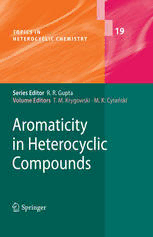Download Aromaticity in Heterocyclic Compounds PDF Free - Full Version
Download Aromaticity in Heterocyclic Compounds by M. Agostinha R. Matos, Joel F. Liebman (auth.), Tadeusz M. Krygowski, Michał K. Cyrański (eds.) in PDF format completely FREE. No registration required, no payment needed. Get instant access to this valuable resource on PDFdrive.to!
About Aromaticity in Heterocyclic Compounds
Aromaticity is a notion that appeared in the mid-nineteenth century to differentiate between unsaturated hydrocarbons and formally unsaturated benzene [1–3]. At the end of the nineteenth century it seemed that cyclicity was a necessary condition for differentiation between the two, but at the beginning of the twentieth century it turned out that the above assumption was not correct because cyclooctatetraene exhibited typical properties known for polyenes [4]. The essential property of b- zene-like compounds, often identified with aromatic compounds, was low react- ity. Hence thermodynamic stability was defined as resonance energy [5, 6] and was the first quantitative measure of aromaticity. Many theoretical approaches were proposed later to estimate this quantity, and now the criterion is often considered to be the most fundamental [7]. Almost at the same time, magnetic susceptibility was used to describe aromaticity [8, 9]. Consequently, many concepts based on mag- tism were developed, probably the most effective in assessment of aromaticity being nucleus independent chemical shift (NICS) [10] or Fowler’s maps of ring currents [11]. The criterion served Schleyer as a basis for a definition of aromat- ity: “Compounds which exhibit significantly exalted diamagnetic susceptibility are aromatic. Cyclic delocalisation may also result in bond length equalization, abn- mal chemical shifts and magnetic anisotropies, as well as chemical and physical properties which reflect energetic stabilisation”[12].
Detailed Information
| Author: | M. Agostinha R. Matos, Joel F. Liebman (auth.), Tadeusz M. Krygowski, Michał K. Cyrański (eds.) |
|---|---|
| Publication Year: | 2009 |
| ISBN: | 9783540683292 |
| Pages: | 354 |
| Language: | English |
| File Size: | 5.821 |
| Format: | |
| Price: | FREE |
Safe & Secure Download - No registration required
Why Choose PDFdrive for Your Free Aromaticity in Heterocyclic Compounds Download?
- 100% Free: No hidden fees or subscriptions required for one book every day.
- No Registration: Immediate access is available without creating accounts for one book every day.
- Safe and Secure: Clean downloads without malware or viruses
- Multiple Formats: PDF, MOBI, Mpub,... optimized for all devices
- Educational Resource: Supporting knowledge sharing and learning
Frequently Asked Questions
Is it really free to download Aromaticity in Heterocyclic Compounds PDF?
Yes, on https://PDFdrive.to you can download Aromaticity in Heterocyclic Compounds by M. Agostinha R. Matos, Joel F. Liebman (auth.), Tadeusz M. Krygowski, Michał K. Cyrański (eds.) completely free. We don't require any payment, subscription, or registration to access this PDF file. For 3 books every day.
How can I read Aromaticity in Heterocyclic Compounds on my mobile device?
After downloading Aromaticity in Heterocyclic Compounds PDF, you can open it with any PDF reader app on your phone or tablet. We recommend using Adobe Acrobat Reader, Apple Books, or Google Play Books for the best reading experience.
Is this the full version of Aromaticity in Heterocyclic Compounds?
Yes, this is the complete PDF version of Aromaticity in Heterocyclic Compounds by M. Agostinha R. Matos, Joel F. Liebman (auth.), Tadeusz M. Krygowski, Michał K. Cyrański (eds.). You will be able to read the entire content as in the printed version without missing any pages.
Is it legal to download Aromaticity in Heterocyclic Compounds PDF for free?
https://PDFdrive.to provides links to free educational resources available online. We do not store any files on our servers. Please be aware of copyright laws in your country before downloading.
The materials shared are intended for research, educational, and personal use in accordance with fair use principles.

